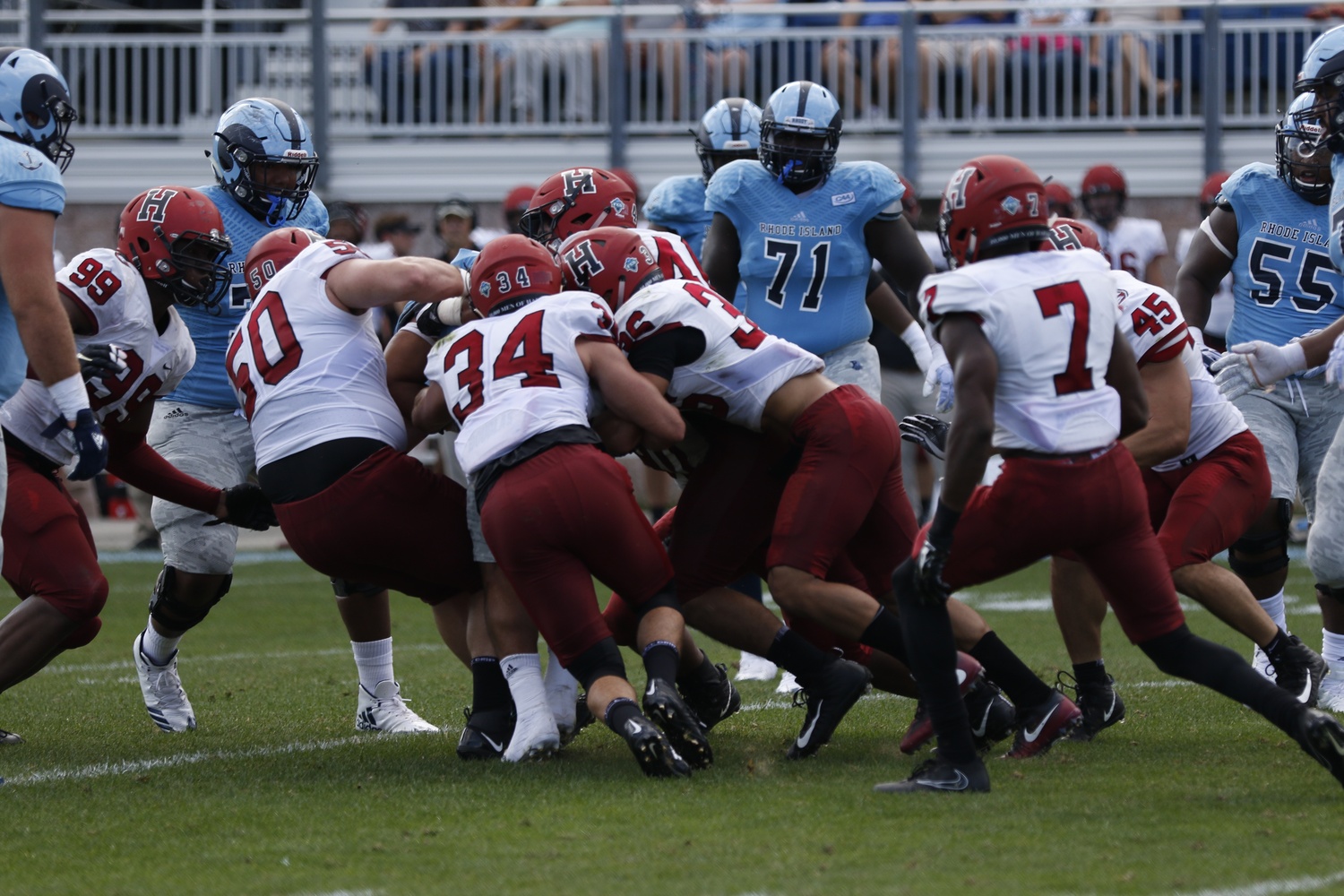
News
Summers Will Not Finish Semester of Teaching as Harvard Investigates Epstein Ties

News
Harvard College Students Report Favoring Divestment from Israel in HUA Survey

News
‘He Should Resign’: Harvard Undergrads Take Hard Line Against Summers Over Epstein Scandal

News
Harvard To Launch New Investigation Into Epstein’s Ties to Summers, Other University Affiliates

News
Harvard Students To Vote on Divestment From Israel in Inaugural HUA Election Survey
Total Parity Defines Ancient Eight Play in 2017

Harvard football coach Tim Murphy has spent a decade preaching about the parity of the Ivy League. It’s time for us to listen.
For years, we could dismiss the sermonizing because Harvard was so dominant. The Crimson hasn’t fallen to Dartmouth or Columbia in 10 years. The program has claimed three of the last five championships. Last season’s loss to Yale ended a nine-game streak.
In 2017, however, the Ancient Eight is a barroom brawl. Seven teams have legitimate title aspirations. Princeton, picked to win the conference, doesn’t have an Ivy win. Neither does Penn, picked to finish third. Meanwhile, Columbia—which stomached 24 straight defeats between 2013 and 2015—owns a 4-0 record.
So far, Harvard has played Brown and Cornell, likely the two weakest programs in the Ancient Eight this year. The Crimson has emerged with a 1-1 record. The Big Red did more than defeat Harvard. Cornell truly overpowered its opponent, racking up 233 rushing yards and owning a 13:40 advantage in time of possession.
Not long ago, the Crimson and the Quakers owned the Ancient Eight. One of these teams shared the title in nine of the last 12 years. Gone are the days of Ancient Eight stability. What we’re seeing in 2017 is the dissolution of the traditional power structure. What we’re seeing is an Ivy League revolution.
It’s tempting to dismiss this shift as an early-season blip. Football writers have done so before. “Our kids and our coaches know that there is so much parity in this league,” Murphy said in Oct. 2004. That quote appeared under the title “League Parity Doesn’t Really Exist.” Indeed, led by quarterback Ryan Fitzpatrick ‘09, the Crimson went 10-0 with an average margin of 20.5 points per game.
A similar scenario played out in 2015, my first season as a football writer. “The competition in the league is better than it’s ever been,” Murphy said during the preseason.” You can probably make a strong case that every team in our league is going to be better than they were a year ago…maybe other than Harvard.” The Crimson proceeded to go 9-1 and secure a championship three-peat.
Most seasons, pundits claim that the Penn-Harvard reign has ended—that the Ivy League has developed into a truly competitive conference. Most seasons, the Quakers or the Crimson prove otherwise. But 2017 is different. Parity is real and here to stay.
It used to be the case that only the Crimson pumped out NFL players. Of the 25 Ancient Eight alumni who made August—a group that included veterans such as Ryan Fitzpatrick and Desmond Bryant ‘09—13 hailed from Harvard. This makeup has shifted in recent years. The last two Ivy classes produced 10 NFL graduates. Only three came from Cambridge, Mass.
As Murphy knows, bad teams can beat better ones. Witness the 2017 Rhode Island Rams, who now stand 1-4 but dropped the Crimson in September. Murphy has a reason to fear every adversary, from the seemingly benign (Yale last year) to the obviously intimidating (Penn last year). Early-season upsets can give the illusion of true competitiveness.
The difference is, there are no bad teams this year (or maybe one—sorry, Brown). In 2017, almost all of Harvard’s remaining opponents fall into the “obviously intimidating” category. The Crimson is 2-2 and still must play the six most challenging league foes. The Tigers are salivating at the chance to avenge an overtime loss to Harvard in 2016. The Bulldogs are averaging over 40 points per game. The Quakers have the most talented player in the Ancient Eight. The Lions may have the best defense.
Even an upcoming matchup with Lafayette offers little respite. The Leopards have jumped to a 2-0 start in conference play thanks to wins over Holy Cross and Fordham. The Lafayette defense, which has given up two touchdowns in the last 120 minutes, will challenge Harvard.
All these external opponents loom, and the Crimson has some internal challenges, too. Freshman quarterback Jake Smith is surprisingly capable—elusive, smart, and accurate. He’s also young and turnover-prone. Against Cornell, the defensive line proved toothless, and the offensive line let up five sacks.
The matchup with the Leopards offers a chance to fine-tune these units—a critical venture given the parity of the Ancient Eight.
—Staff writer Sam Danello can be reached at sam.danello@thecrimson.com.
Want to keep up with breaking news? Subscribe to our email newsletter.
